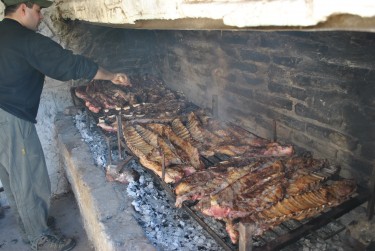In Argentina, a widely diverse country perhaps based on the distinct waves of migration that it has had, two topics exist that, one way or another, all Argentinians will always discuss: football (soccer) and the price of beef.
Football, if not the official national sport, is the one most viewed by the population. Every weekend, it is a sacred Argentine ritual. And if it is accompanied by a roast with friends or family, even better.
Until 2009, football broadcasts lied in the hands of a private channel that had commercialization of the live broadcasting rights. This implied that football was being viewed through one single, private channel or through TV companies on cable. In 2009, however, the Argentine Football Association [es] finalized its contract with a private company and the Argentine state obtained exclusive broadcasting rights.
As such, the “Futbol para todos” [es] (“Football for all”) program was started. Starting on August 21, 2009, all football matches have been televised through open channels.
In the blog ENFOQE [es], they explain the reasons behind the implementation of the program:
Cuando surgió la idea de sacarle al Grupo Clarín la exclusividad de la emisión de los partidos, la gran mayoría se contentó y aplaudió la iniciativa. En aquellos momentos, se decía (y con razón) que el producto Fútbol de Primera era centralista que hablaba solamente de Boca, River y de los clubes de Buenos Aires. Además, se hacía hincapié en que en las transmisiones eran siempre los mismos periodistas que tenían un discurso único y hasta tenían la hidalguía de hacer bromas y chistes internos dejando al televidente anonadado. Esta promesa de cambio, entonces, se vio con buenos ojos para dejar definitivamente atrás ese tedioso producto que, además, era pay per view.
This sparked a succession of programs “for all,” launched on behalf of the national government, among which were “refrigerators for all,” and the two most recent “milanesas [breaded beef or chicken breasts] for all” and “meat for all.”
An official YouTube video shows the “Carne para todos” (“Meat for all”) launch:
6 de Abril de 2011, Buenos Aires: La presidenta Cristina Fernández recorrió los camiones del programa “Carne para todos”, que venderá hasta 10.000 kilos de diferentes cortes por día a precios populares. Por ejemplo, el kilo de asado costará $10,50 [$2.57 dólares] y se ofrecerán trece cortes diferentes, que serán los más buscados, a precios accesibles.
As a result of the program's launch, reactions and criticism from Argentine bloggers began to emerge, as in the case of Econoblog [es], which comments on the program's objective.
El programa tiene el objetivo de ofrecerle a los consumidores carne vacuna a precios más bajos, luego de que en los últimos meses sufriera varios aumentos de precio, ya la mandataria había reconocido que los puntos sobresalientes de la inflación se debían al alza de este producto, que impacta directamente en el valor de la canasta de alimentos.
Blog Reportero 24 [es] also writes about the logistics in one of Buenos Aires’ neighborhoods at the time of the launch:
Los camiones estarán equipados con una cámara frigorífica, un grupo electrógeno y un mostrador. Desde el viernes, habrá dos en Virrey del Pino y los vecinos podrán empezar a aprovechar el beneficio.
Nevertheless, some bloggers calculate to see if the program can expand its reach to the entire population, as in the case of blog Comentando las noticias de ayer [es]:
PRIMER APROXIMACIÓN: una vaca gorda, para ir a matarife puede rondar los, digamos, cuatrocientos kilos. De allí, saldrán doscientos kilos de carne para consumo. Para llegar a los 10.000 kilos de carne por día prometidos por la señora presidenta, son necesarias 50 vaquillonas gorditas. En Liniers -sólo en Liniers- se rematan por día, un promedio de cuatro mil animales.
SEGUNDA APROXIMACIÓN: se calcula que en un asado, una persona come medio kilo de tira aproximadamente. De ser esto cierto (yo sostengo que es una cuenta muy pijotera, yo como más que eso, pero ponele), los 10.000 kilos de carne por día prometidos por la señora presidenta, alcanzarían para unos 20.000 argentinos.
FIRST APPROXIMATION: a fat cow to slaughter can go for, let's say, four hundred kilos. From there, two hundred kilos of meat will remain for consumption. To get to 10,000 kilos of meat per day, as promised by our lady president, we need 50 chubby cows. In Liniers — and only in Liniers — they round off per day, an average of four thousand animals.
SECOND APPROXIMATION: We calculate that in a roast, a person eats approximately half a kilo of ribs. Should this be true (I maintain that it's too light, I eat more than that, but let's stick to it), the 10,000 kilos of meat promised by our lady president, would reach some 20,000 odd Argentinians.
And the blog summarizes:
Parece que números sacados muy en el aire, y muy tempranito en domingo, nos llevan a la conclusión de que “carne para todos” es carne para MUY POQUITOS, que el anuncio es, una vez más, un anuncio publicitario, y seguramente un negocio para alguno.
Other bloggers, like Humberto Acciarressi [es], analyze other proposals “for all”:
Primero fue “Futbol para todos”, luego “Milanesas para todos”, en la misma senda arribó “Merluza para todos” y recientemente “Carne para todos”. Que en realidad ni es “para todos” ni, en muchos casos, es lo que dice ser (¿a nadie se le ocurre lanzar el programa “Trabajo para todos” que por carácter transitivo erradicaría todos los demás?). Pero, a diferencia del salmón, sigamos un rato la corriente. Ahora, en este furor de la dádiva vestida de justicia social, un diputado radical propone lanzar el “Vino para todos”, seguramente inspirado por Baco en una noche etílica.
Contrastingly, blog El ojo con diente [es] relates the aspects of the diverse plans launched by the Argentine government:
yo creo que los planes (milanesas, pescado, ahora carne) “Para Todos” es uno de los grandes aciertos comunicacionales del Gobierno. Porque demuestran al conjunto de la población que es posible que los empresarios ofrezcan sus productos a precios sensiblemente menores a los que se ven en la mayoría de las góndolas y que aún así pueden seguir teniendo fabulosas ganancias.
And ends with [es]:
Pero esta medida, que tiene un fuerte valor simbólico, demuestra a las claras quiénes son los responsables de los aumentos de precios.
The Presidential elections are scheduled for October 23, 2011 and with respect to this, Alba Cuozzo sends her commentary to La Historia Paralela [es]:
La Presidenta anuncia que habrá cortes de carne económica para todos, como el costo -risorio- de las milanesas y, así seguirá manifestándose antes de la fecha de elecciones. Olvidó, que también deberá ofrecer “dentaduras” especiales para poder comer sus “ofertas”. Ofende la inteligencia de la población y debe creer que ésta, sucumbe ante sus espejitos de colores.
Argentine President Cristina Fernández de Kirchner has her own page on Facebook. The announcement on the social network generated repercussions of a diverse nature, as Maria Ester Balzán comments [es]:
Apoyo toda gestion realizada y vayamos por mas aunque hayan personas con pensamientos individualistas y egoistas que no puedan disfrutar la ayuda de los que lo realmente lo necesitan, a mi me alegra el alma. Tengo salud y cerebro para lograr mis propositos, gracias a Dios, me hace feliz esta ayuda para los mas vulnerables. Gracias
And what about vegetarians? Carol Vales Garbo [es], on CFKARgentina [es], speaks out with respect to this:
mejor que saque un programa verduras para todos! o al menos para los vegetarianos!!!









2 comments